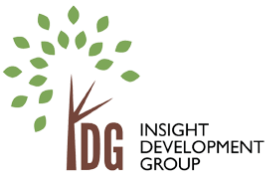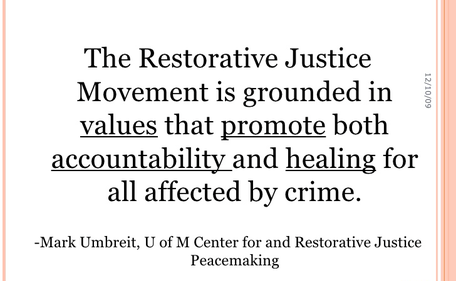Our Mission...The current mission of the Insight Development Group is to provide a transformative learning environment where adults in custody seeking restorative responses to crime, can safely explore the underlying causes of harm doing, and understand more deeply the impact their harms have had upon their victims, families, and the community. I.D.G. also serves as a restorative justice capacity building program which meaningfully prepares participants who may potentially enter into direct encounters or dialogue processes with harmed parties. The I.D.G. fulfills this mission by offering a critical and integrated curriculum exploring and developing personal awareness and core competencies in the areas of:
"It is our goal to understand the depth of our actions - those that brought us here and those that led up to our crimes - and how they have affected victims and those around us. In doing so, we will be more able to perceive situations with empathy and make decisions that take into account our communities and families. This program is intended purely for personal growth, knowledge and rebuilding our ability to connect to the community. It will not result in a certificate of completion or letters of recommendation."
- Original Mission Statement of the Founding Four Inmates of the IDG, 2008 Our Values . . .We Value Racial & Social Justice. We can not meaningfully discuss restorative justice without acknowledging and addressing the historical and systemic contexts of oppression and racism of the criminal justice system in the United States.
Acknowledging the past:
We Value Diversity, Equity, Inclusion, and Belonging (DEIB). IDG acknowledges and supports the collective and individual obligations that have arisen due to this harmful history. IDG also acknowledges that the legacy of white supremacy and systemic racism continues both overtly and less overtly in our culture and systems today. We recognize that the goals of DEIB do not arise from a one-off training or simply reading articles or books. True equity and inclusion require a shift in attitudes, mindsets and values, and is an ongoing process of change. IDG remains committed to the efforts of racial and social justice allyship through critical self-reflection, and actions of self-improvement. Social and Collective Obligations: Although the past can never be undone, as allies in racial and social justice we must seek to engage in, and advocate for:
IDG's Organizational Obligations: The Insight Development Group has an obligation to deconstruct it's own barriers to racial justice and equity and we remain committed to this mission by:
More Values...
|
|




